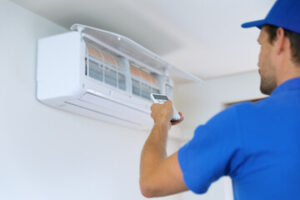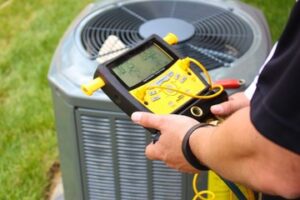Air conditioning works to cool air and also decreases humidity. It’s important to find the right system for your home.

Most modern AC systems use heat pump technology to both cool and heat your home. The circulating gas is called Freon, though other gases are used as well at higher pressures. Contact Ausco Air Heating & Air Conditioning for professional help.
Air conditioning is one of the biggest energy consumers in homes, especially in hot climates. However, by opting for energy efficient models, this can be reduced substantially. This not only reduces electricity bills but also helps to mitigate the impact of climate change, as well as contributing towards energy poverty alleviation.
A common way to measure energy efficiency is by looking at the Seasonal Energy Efficiency Ratio (SEER). This measures how much cooling is produced per unit of electrical power over a typical cooling season. Another useful measurement is the Coefficient of Performance or COP, which looks at how many British thermal units (BTU) are generated for every kW of electricity used. Using this, you can easily compare different models when shopping for an AC unit.
An air conditioner works by drawing in air from outside, reducing its temperature and humidity. This is done via a coil filled with refrigerant, which absorbs heat from the air, and then ejects it into the building through a network of ducts. The air is then circulated throughout the space by a fan, which removes the excess moisture and provides additional cooling.
In terms of squeezing the most efficiency out of your AC, you should look for units with an Energy Star label, or equivalent. This indicates that it meets the US Environmental Protection Agency’s stringent energy-efficiency requirements. In addition, choose a unit that uses low-carbon refrigerants. Initially, AC units used chlorofluorocarbons (CFCs) which have since been phased out due to their harmful effects on the ozone layer. Currently, many of the best AC units use hydrofluorocarbons (HFC) or the latest low-carbon A2L refrigerants.
Finally, make sure your air conditioner is properly sized for the space it is working in. An oversized system will consume more energy and have less dehumidification capabilities.
While there are a few ways to improve the energy efficiency of your AC, changing light bulbs and installing low-flow showerheads are also great starting points. In fact, these small changes can have a significant impact on your energy consumption and carbon footprint. For those who are serious about reducing their environmental impact, an eco-friendly air conditioning system is the way to go.
Lower Temperatures
An air conditioning system can achieve much lower indoor temperatures than what one would expect from an ordinary fan. That’s because air conditioners have the ability to remove humidity, creating a comfortable and breathable environment. Additionally, the efficiency of your air conditioning will affect how quickly it cools your home and how long that cooling lasts. Air sealing, cleaning filters, and regular maintenance will all contribute to the effectiveness of your AC system.
Enhanced productivity is another major benefit of air conditioning, with studies showing that employees are far more productive in a temperature-controlled environment. This is especially true when working from home, where an uncomfortable environment can reduce focus and performance.
Cooler indoor temperatures are also good for mental health and wellbeing. A hot and stuffy environment can raise stress levels, leading to an overall negative impact on mood. A properly maintained air conditioner creates a calming and relaxing environment, supporting an optimal sleep cycle that improves mental health and well-being.
Aside from enhancing comfort and wellbeing, air conditioning systems can help prevent dehydration by reducing the amount of sweat we produce. This is particularly helpful for people with sensitive skin and allergies, as excessive sweat can lead to itching and rashes. Air conditioning ensures that you don’t experience discomfort or irritability as you work, making it easier to concentrate on tasks at hand.
While air conditioning can make your home a much more pleasant environment, it’s important to be aware that excessive use of the system can cause dry skin. This is because the air conditioner will pull moisture from the air, just like an ice-cold drink can lose its frosty appeal when placed in a warm room for too long. Using moisturizers, not over-using the air conditioner, and keeping drapes and blinds closed when not in use will help to minimize this effect.
In addition to boosting energy efficiency, a properly sized and maintained air conditioning system can protect valuable electronic equipment from overheating. The cooling process will remove excess heat, protecting delicate components from damage and prolonging the lifespan of your computers, televisions, and other electronics.
Reduced Risk of Heat Stroke
Heat stroke occurs when the body’s normal system for cooling itself, through sweating, stops working. When this happens, the body’s temperature rises rapidly and can damage internal organs or lead to death. It is a serious medical emergency and should be treated immediately. Heat stroke symptoms include a high body temperature, red hot or dry skin (no sweating), throbbing headache, dizziness, nausea, confusion and unconsciousness.
People in poor health or with chronic conditions are more at risk of heat stress and its complications. These individuals often take medications that slow down or interfere with the body’s ability to react to extreme heat, and may have limited access to air conditioning and other cooling protections. The elderly, infants and young children are also more sensitive to extreme heat. During heat waves, many urban communities are especially vulnerable to heat-related illness due to high temperatures and dense housing stock with little natural cooling.
The risk of heat-related illness is increased when humidity is high, because it slows the evaporation of sweat and prevents the body from cooling itself. Air conditioning reduces humidity and makes it easier for the body to cool itself.
A person who experiences the symptoms of heat stroke should be moved to a cool, shady place and given fluids slowly, such as water or fruit juices with electrolytes. This should be done by someone other than the person suffering from heat stroke, who should monitor the person closely for changes in condition and call 9-1-1 if necessary.
To help prevent heat-related illness, it is important to stay hydrated during hot weather, and avoid drinking alcohol or caffeinated beverages. It is also a good idea to wear light, loose clothing that allows the skin to breathe, and avoid strenuous activities on extremely hot days.
When air conditioning is not available, individuals should stay in cool, shaded areas where possible, and take a cool shower or bath to refresh the body. They should also cover their bodies with lightweight, loose clothing to protect the skin from the sun and use a fan to push cool air over their bodies.
Reduced Risk of Dehydration
Air conditioning is a great way to cool the home or workplace, but it can lead to dehydration. This is because it lowers indoor humidity levels and causes a lot of moisture to evaporate from the skin and respiratory tract. This can lead to a dehydration problem that may be difficult to notice, especially since the body is losing water without feeling thirsty. In order to avoid this, you should drink water regularly and use a humidifier to counteract the dryness of the air conditioner.
Aside from causing dehydration, the cooling effect of air conditioning can also cause dry eyes and skin. To prevent this, you should drink plenty of water and apply moisturizing creams to your skin. You should also try to eat foods that are high in water content such as cucumbers, watermelons, and oranges. If you want to take it a step further, you can try using an infuser to add flavor to your drinks. This can make your drinking water more enjoyable and palatable. You should also monitor your urine color to ensure that it is light yellow. Dark urine is an indication that you are losing too much fluid.
In addition to these health benefits, air conditioning can reduce the risk of heat stroke by lowering room temperature and decreasing blood pressure. It can also reduce the risk of infections by preventing the growth of harmful microorganisms in the home or workplace. It can even help reduce the symptoms of allergies by keeping dust mites away from the skin. It is important to maintain your air conditioning by cleaning the filters regularly and opening windows in order to keep the air fresh.
